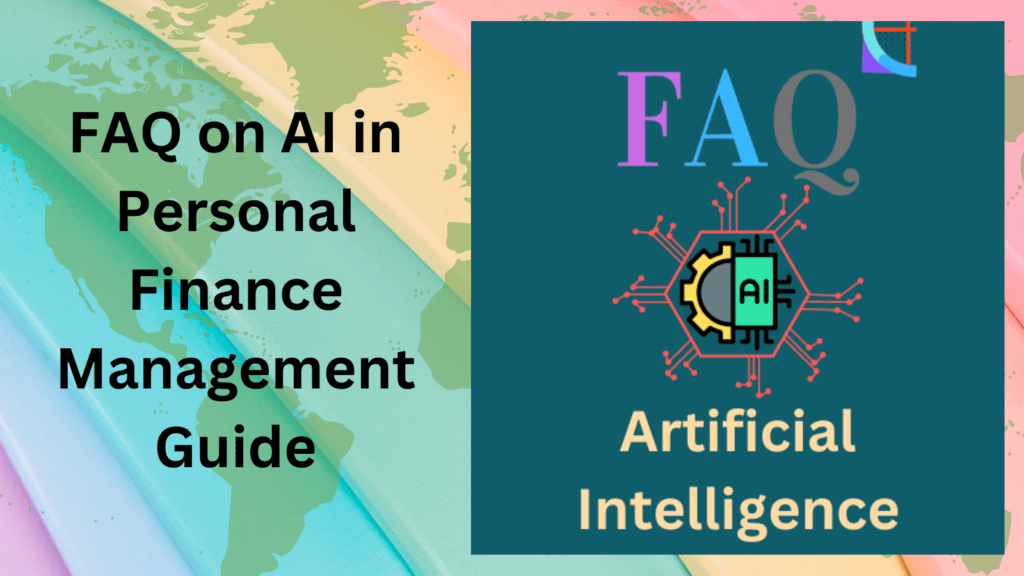
General Questions on AI in Personal Finance
What is AI in personal finance management?
Answer: AI in personal finance management involves using technologies like machine learning and natural language processing to automate and enhance financial tasks1…. It helps in budgeting, investing, expense tracking, and financial planning.
How can AI help me with my personal finances?
Answer: AI can automate tasks, provide personalized advice, analyze large amounts of data, offer predictive insights, and improve financial decision-making. It can help with budgeting, saving, investing, and managing debt.
What are some common applications of AI in personal finance?
Answer: Common applications include AI-powered budgeting apps, robo-advisors for investment, expense trackers, and AI chatbots for customer service.
Is AI safe to use for managing my finances?
Answer: While AI offers many benefits, it’s important to be mindful of data security and privacy. Choose reputable platforms that use strong encryption to protect your information. It is also important to be aware of potential biases in AI algorithms.
Can AI replace human financial advisors?
Answer: AI can automate many tasks but might lack the empathy and emotional intelligence of a human advisor. Hybrid models combining AI and human advice are also available.
Do I need to be tech-savvy to use AI for personal finance?
Answer: No, many AI tools are designed to be user-friendly. They use natural language processing and intuitive interfaces to make them easy to use, even for beginners.
AI for Budgeting and Expense Tracking
How can AI help me create a budget?
Answer: AI can analyze your financial data, identify spending patterns, categorize expenses, and suggest areas for saving. It helps create a realistic and effective budget based on your income and financial goals.
Can AI track my expenses automatically?
Answer: Yes, many AI-powered apps can automatically track your expenses, categorize them, and provide detailed reports. This helps you monitor your spending habits and identify areas where you can cut back.
What if my financial situation is complex?
Answer: AI can handle complex financial data and provide personalized recommendations, but human oversight is still valuable. It can also pull in additional data from various sources to give you an accurate picture.
AI for Investment
What are robo-advisors?
Answer: Robo-advisors are digital platforms that use AI to manage investment portfolios, offering automated, algorithm-driven financial planning and investment services with little to no human supervision.
How do robo-advisors work?
Answer: They assess your risk tolerance, financial goals, and time horizon through a questionnaire, then create and manage a diversified investment portfolio. They also automatically rebalance your portfolio and make adjustments based on market data.
Can AI help me with stock trading?
Answer: AI can analyze market trends, make predictions, and execute trades through algorithmic trading. However, it’s important to understand the risks associated with these complex strategies.
Is AI better than a human for investment advice?
Answer: AI is fast, efficient, and unbiased, but it may lack human understanding and judgment. Hybrid robo-advisors offer the best of both worlds.
Can AI help with research and due diligence?
Answer: Yes, AI can pull in data from various sources and perform tasks related to research and due diligence. It can generate reports, summarize information, and identify potential risks.
How can I use AI to find new investment opportunities?
Answer: AI can analyze market data, identify trends, and suggest potential investment opportunities. AI tools can also compare various stocks and funds.
AI for Debt Management and Financial Planning
Can AI help me manage my debt?
Answer: AI can analyze your debts, suggest repayment strategies, and help you manage all your liabilities.
How can AI help with financial planning?
Answer: AI can create personalized financial plans based on your unique goals and circumstances. It continuously monitors your financial performance and makes adjustments as needed.
What is financial risk management, and how does AI play a role?
Answer: Financial risk management involves identifying, assessing, and controlling financial risks. AI helps by accurately predicting and analyzing potential financial risks. It also helps to create strategies for risk management.
How can AI help with fraud detection?
Answer: AI can monitor financial transactions for patterns or rules associated with potential fraud, flagging suspicious activities. This can help reduce fraud and protect your assets.
AI Tools and Technologies
What are some AI tools I can use for personal finance?
Answer: AI tools include budgeting apps, robo-advisors, personal finance management apps, chatbots, and AI-powered search engines.
Are there free AI tools for personal finance?
Answer: Yes, many free tools are available, though some may have premium versions with more features.
Getting Started with AI in Personal Finance
How do I choose the right AI tool for my needs?
Answer: Consider your financial goals, tech-savviness, budget, and the specific features you need. Read user reviews and compare different options.
How do I get started with using AI for personal finance?
Answer: Start by identifying your financial objectives. Then, collect and prepare your financial data. Choose the AI tools that suit you best. Test and validate the results, and ensure that you continuously improve the process.
What data do I need to provide to AI tools?
Answer: You may need to provide your income, expenses, assets, liabilities, and financial goals. Some AI tools also gather additional data from your bank account or social media.
How can I ensure that my financial data is safe when using AI tools?
Answer: Choose reputable AI tools with strong security measures. Read the privacy policy of the apps and make sure your data is encrypted.
Also Check our the FAQ on How to Spot and Avoid Email and Phishing Scams